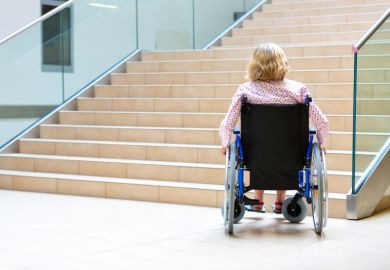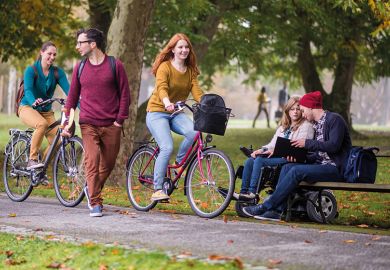Aspiring academics typically begin their careers with a job interview. We put on our smartest outfit and traipse off to present our work, discuss our research with the interview panel, and then hope for the best. I well remember carefully preparing my talk and selecting an elegant red dress to wear to my own lectureship interview in 2018. Gaining this role has given me the stability and support that I needed to succeed in my field.
But my experience is all too uncommon. I am one of the 4.2 per cent of UK academics in teaching and research posts who have disclosed themselves as disabled. You may be surprised that this figure is so low when you consider that 20 per cent of the UK working-age population is disabled. When you learn that 14.4 per cent of first-year undergraduates are disabled, you may wonder why more don’t stay on to become academics. The answer is complex, but one important factor is the barriers that are built into the recruitment process.
In 2010, the UK Equality Act made disability a protected characteristic. A series of programmes have since been implemented to support the recruitment of disabled people, but success has been mixed. The Two Ticks scheme, for instance, was supposed, among other things, to guarantee interviews for qualified disabled applicants. However, it transpired that participating organisations were no more likely to monitor or review their recruitment procedures by disability than non-participating ones, and the scheme was quietly axed in 2016.
The UK government’s latest scheme, Disability Confident, initially sounded like it would do something similar. I assumed that it would give candidates with disabilities the opportunity to prove themselves at interview. Then I realised that even certified employers – which include many universities – are not legally required to meet their commitment to offer disabled people an interview when they meet the essential criteria for a role.
Some universities do state that they maintain a guaranteed interview scheme. However, too many disabled academics have a story of how guaranteed interview schemes have not supported their career progression. I know of several highly qualified people who have been forced into a stalemate by their prospective universities: a brilliant professor who is blind, an outstanding researcher with hearing impairment, an award-winning lecturer with chronic illness. There are many more.
Before applying, they typically review the job criteria to confirm that they are qualified and would be a good fit. And they disclose their disability on the application form, believing this will guarantee them an interview under the university’s own policies. But then the recruiting academic goes silent. Weeks pass, emails go unanswered, until eventually the disabled applicants receive an automated message that they have been rejected without interview. If they ask why they haven’t been interviewed under the guaranteed interview scheme, they risk marking themselves out as troublemakers in an over-saturated and precarious sector. It’s easier just to say nothing.
Instead of levelling the playing field, the optional Disability Confident guaranteed interview scheme has created an illusion of equality. To participate, applicants must disclose their disability to the recruiting academic, leaving them vulnerable to the prejudices of the academic recruiter. Potentially, it is just a handy way for recruiters to identify and then exclude qualified but disabled candidates. While it could be argued that this would be direct discrimination and therefore contrary to the Equality Act, most candidates for jobs in academia will not have the time or money to pursue legal action against a university.
So, the question arises: who actually benefits from these schemes? I went in search of data to find out. I wanted to know the proportion of disabled academics who were interviewed because of a Disability Confident guaranteed interview scheme, in the context of the number of disabled applicants overall. I wanted to quantify whether the scheme had improved disabled academics’ opportunities and inclusion. Unfortunately, there is no requirement for universities or even the Department for Work and Pensions, which oversees the scheme, to report data centrally or publicly. Nor is there any record of any organisation being removed from the scheme because it didn’t comply with its requirements.
Nick Bacon, whose Disability at Work project seeks to understand and improve career outcomes for disabled people, confirmed to me that there is no evidence that Two Ticks or Disability Confidence scheme members have hired or retained more disabled people or treated disabled employees any more equitably than other workplaces. Yet other initiatives, such as Stonewall’s Diversity Champions programme for LGBTQ+ equality, have had demonstrable results. Nick, who is professor of human resource management at City, University of London, clarified that reporting outcomes and accountability must be built into any disability parity scheme to ensure that it isn’t just empty posturing, and that real change happens.
Until that happens, I will not tick the “disabled” box on any application form. And academia will continue to miss out on the benefits that a diverse workforce brings.
Becky Alexis-Martin is a lecturer at Manchester Metropolitan University. She is the author of Disarming Doomsday: The Human Impact of Nuclear Weapons since Hiroshima and winner of the L.H.M. Ling Outstanding First Book Prize 2020. She is one of the Shaw Trust Disability Power 100 Most Influential People in Britain 2022.
Register to continue
Why register?
- Registration is free and only takes a moment
- Once registered, you can read 3 articles a month
- Sign up for our newsletter
Subscribe
Or subscribe for unlimited access to:
- Unlimited access to news, views, insights & reviews
- Digital editions
- Digital access to THE’s university and college rankings analysis
Already registered or a current subscriber?








